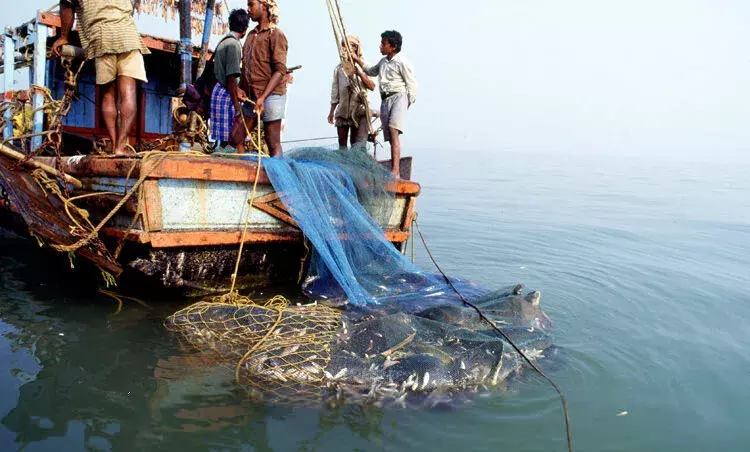Fishing In Troubled Waters
The Govt draft says all Indian vessels will require a permit to fish in the high seas

The Union Government's draft guidelines on deep sea fishing has triggered unrest among fishing communities along the coast of Tamil Nadu and Kerala. According to the fishermen, who are mostly engaged in traditional methods of fishing, this Bill seeks to corporatise the fishing sector. That will force them away from the high seas, and will hence eventually force them out of their occupation.
According to the Bill, all Indian flagged vessels will require a permit to fish in the high seas and vessels with a length of more than 25 metres will have to pay a fine of Rs 5 lakh. The draft policy also makes it clear that the process of getting permits would be centralised. This, the fishermen say, is a cause of concern as not all fishermen can go to Delhi just to get a licence. They also claim that the entire bill seems to favour the corporates more than the fishermen.
The All India Deep Sea Fishers Association has written a letter to the Union Government stating that the provisions of the draft policy be reviewed and the fees reduced. The Bill also seeks to implement a fishing limit, up to a value of 12,000 rupees per day. Fishermen look at these issues as a threat to their future.
One of the central issues the traditional fishermen face is the depletion of freshwater due to high industrial activity along the coastlines. According to Vareethiah Konstantine, a writer and environmentalist from Kanyakumari who has been studying coastal ecosystems, "due to the operation of corporate sectors and their encroachment along the coastline, the quantum and quality of fisheries in nearshore water is plummeting at a fast pace.
"The nearshore waters do not get the same volume of freshwater every year as they had been receiving in the past. Heavy pollution due to clustering of industries along the coast and the freshwater mixing with the sea contribute to a faster decline in fisheries. That is a serious issue.
"One reason why the fishermen are protesting strongly against the bill is because what they had in nearshore waters earlier is depleting, so they are naturally forced to go deeper and deeper. When you try to stop them from going into the deep sea, they don't have a future.
"The nearshore waters need to be protected and some sort of regulation of nearshore waters and fisheries need to be framed. But the government is doing the opposite."
Konstantine also said that the issue actually dates back to the 1980s when foreign vessels were allowed by the union government to fish in Indian waters. "They couldn't monitor where they actually engage in fishing and what kind of fishing methods were adopted and the quantity they were harvesting.
"There were some attempts by the government to create a system to monitor the movement of these vessels in Indian waters. The joint venture programme was to allow Indian fishermen to be trained in using foreign vessels.
"The Union government did not ask for any share or division of profit from these vessels, but in return they wanted foreign vessel users to train our fishermen. That didn't happen. Then some kind of a tracking system to monitor the movement of foreign vessels in Indian waters was developed. That mechanism didn't work either.
"Now, the fishermen are angry because a government that didn't even care about the illegal fishing by foreign vessels is imposing many restrictions on native fishermen, who use native fishing vessels."
He added, "we need to look at it in relation to other issues such as land rights, agricultural land and rights of hill tribes. All of them are under the same kind of treatment at the hands of the government. This trend is not healthy. It is time that fishermen or farmers stop fighting on their own, it's time they come together, because their problem is the same.
"You see reports about laying roads along the coast and international transhipment terminals. There are struggles all over the coast in the country. People understand that they don't have a future when they are removed from the coast and the government is taking every effort to take them off from their traditional livelihood with their draconian legal instruments. It's an alarm for all working classes."



